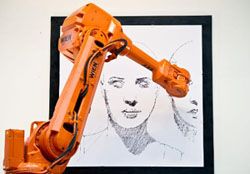Q1. Will a robot take your job?
A1. My result: Assimilate This

More Future Thinking About Stuff...
So this week Foxconn has begun making the switch to robots on the iPhone production line. They are cutting 60,000 factory worker jobs in China. As it has become financially viable to make this switch now, I suppose thanks in part to factors like Moore's Law and the ready increase of computing power at decreasing costs. (Well I guess too that Apple felt a need to offset their magnificent losses from the recent blocking of iTunes and iStore on Mainland China. And it may also relate with Apple's billion-dollar investment in China's Uber-rival Didi Xuching; and the future of automated vehicles, for which it sees China as a critical early adopting market. But that's another bedtime story).
Robotics can permit manufacture closer to the market to reduce shipping and logistics costs. Not only could increased automation de-centralize manufacturing hubs, (and gut local economies), it can redistribute industry almost anywhere, probably nearer to the customers themselves.
It also marks a kind of bellwether, as low-grade manufacture becomes a model industry decimated by robotic automation; which is now catching on with other manufacturers and gaining interest. It will spread to other industries too; particulary those with low skills requirements like driving or customer service. Eventually even high-grade manufacture may make the switch to automation.
We've already seen this kind of tech-saturation occur in other fields; such as Publishing and Media at the advent of the internet; and Public Transportation with the advent of the smart phone and mobile applications for private taxi services. Or even outsourcing call centers to other countries using VOIP technologies. Maybe a Hyperloop system cutting into the airline industry. I'm sure plenty of people here can cite other real-life examples of this "John Henry" story.
The general question ties in with other factors too, like replicator economics, oversupply of goods, academic inflation and decline of trade industry workforce, etc.
So here are some other questions:
Q2. What else besides robots could destroy demand for your job?
Q3. What other big changes, in your opinion, are in the works?
Q4. What new industries are emerging?
Q5. What will all those low-skilled workers do with their new free time?
Q6. Your Question_________________?
What do you think?
Last edited:


 Where I work, they're strongly opposed to timers, I don't think they'll let bots take over....yet.
Where I work, they're strongly opposed to timers, I don't think they'll let bots take over....yet.